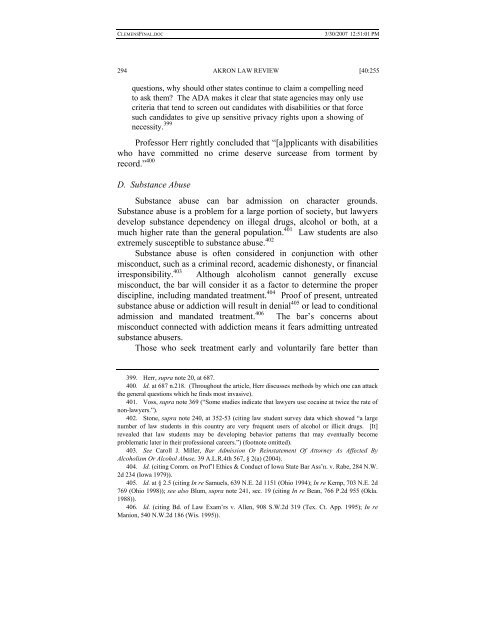Facing the Klieg Lights: Understanding the "Good Moral Character"
Facing the Klieg Lights: Understanding the "Good Moral Character"
Facing the Klieg Lights: Understanding the "Good Moral Character"
Create successful ePaper yourself
Turn your PDF publications into a flip-book with our unique Google optimized e-Paper software.
CLEMENSFINAL.DOC<br />
3/30/2007 12:51:01 PM<br />
294 AKRON LAW REVIEW [40:255<br />
questions, why should o<strong>the</strong>r states continue to claim a compelling need<br />
to ask <strong>the</strong>m? The ADA makes it clear that state agencies may only use<br />
criteria that tend to screen out candidates with disabilities or that force<br />
such candidates to give up sensitive privacy rights upon a showing of<br />
necessity. 399<br />
Professor Herr rightly concluded that “[a]pplicants with disabilities<br />
who have committed no crime deserve surcease from torment by<br />
record.” 400<br />
D. Substance Abuse<br />
Substance abuse can bar admission on character grounds.<br />
Substance abuse is a problem for a large portion of society, but lawyers<br />
develop substance dependency on illegal drugs, alcohol or both, at a<br />
much higher rate than <strong>the</strong> general population. 401 Law students are also<br />
extremely susceptible to substance abuse. 402<br />
Substance abuse is often considered in conjunction with o<strong>the</strong>r<br />
misconduct, such as a criminal record, academic dishonesty, or financial<br />
irresponsibility. 403 Although alcoholism cannot generally excuse<br />
misconduct, <strong>the</strong> bar will consider it as a factor to determine <strong>the</strong> proper<br />
discipline, including mandated treatment. 404 Proof of present, untreated<br />
substance abuse or addiction will result in denial 405 or lead to conditional<br />
admission and mandated treatment. 406 The bar’s concerns about<br />
misconduct connected with addiction means it fears admitting untreated<br />
substance abusers.<br />
Those who seek treatment early and voluntarily fare better than<br />
399. Herr, supra note 20, at 687.<br />
400. Id. at 687 n.218. (Throughout <strong>the</strong> article, Herr discusses methods by which one can attack<br />
<strong>the</strong> general questions which he finds most invasive).<br />
401. Voss, supra note 369 (“Some studies indicate that lawyers use cocaine at twice <strong>the</strong> rate of<br />
non-lawyers.”).<br />
402. Stone, supra note 240, at 352-53 (citing law student survey data which showed “a large<br />
number of law students in this country are very frequent users of alcohol or illicit drugs. [It]<br />
revealed that law students may be developing behavior patterns that may eventually become<br />
problematic later in <strong>the</strong>ir professional careers.”) (footnote omitted).<br />
403. See Caroll J. Miller, Bar Admission Or Reinstatement Of Attorney As Affected By<br />
Alcoholism Or Alcohol Abuse, 39 A.L.R.4th 567, § 2(a) (2004).<br />
404. Id. (citing Comm. on Prof’l Ethics & Conduct of Iowa State Bar Ass’n. v. Rabe, 284 N.W.<br />
2d 234 (Iowa 1979)).<br />
405. Id. at § 2.5 (citing In re Samuels, 639 N.E. 2d 1151 (Ohio 1994); In re Kemp, 703 N.E. 2d<br />
769 (Ohio 1998)); see also Blum, supra note 241, sec. 19 (citing In re Bean, 766 P.2d 955 (Okla.<br />
1988)).<br />
406. Id. (citing Bd. of Law Exam’rs v. Allen, 908 S.W.2d 319 (Tex. Ct. App. 1995); In re<br />
Manion, 540 N.W.2d 186 (Wis. 1995)).
















